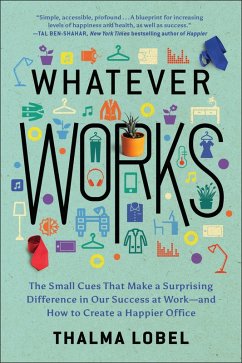In Whatever Works: The Small Cues That Make a Surprising Difference in our Success at Workand How to Create a Happier Office, Thalma Lobel, one of the world's leading experts on human behavior, explores groundbreaking psychological research on job performance, satisfaction, and creativity. Lobel goes beyond obvious considerations like salary, title, and company culture to shed light on the hidden factors-often unrecognized, counterintuitive, or invisible-that have profound effects on how well we can do our jobs and how happy we are at work.
Did you know that just doodling in a certain way can increase your creativity? That looking at something green for forty seconds will improve your attention? That crossing your legs similarly to an interviewer could get you the job? That the mere presence of a smartphone on your desk can lessen your performance, even if it's turned off? That being in a warmer room makes you more likely to want to conform with the group, affecting your decision-making? These are the invisible factors that nudge our behavior on a daily basis, and combined, have a real and significant bearing on our success-or failure-at work.
In today's competitive market, where even tiny differences can be decisive, for both employees and organizations, exploiting such factors can make all the difference. The more you know about the subtle elements that can help or hinder you on the job, the better equipped you can be to take control and navigate today's competitive work world. Helpful for anyone from individual employees to managers to leaders of large organizations, Whatever Works shares valuable insights and practical takeaways to transform your professional life.
Dieser Download kann aus rechtlichen Gründen nur mit Rechnungsadresse in A, B, BG, CY, CZ, D, DK, EW, E, FIN, F, GR, HR, H, I, LT, L, LR, M, NL, PL, P, R, S, SLO, SK ausgeliefert werden.









